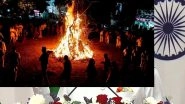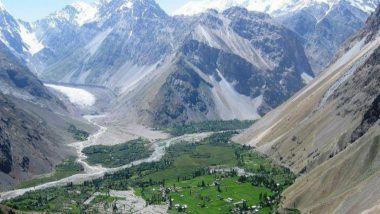By Dr Amjad Ayub Mirza
On Friday, September 18, an attempt by the Imran Khan government to hold a consultative meeting was thwarted when opposition parties announced their boycott of the session called by the Parliamentary Standing Committee for
National Security to discuss a constitutional package for Gilgit Baltistan (GB).
This defeat of the Imran Khan government comes at a time when a general election in GB is expected by the end on November 2020. In a desperate attempt to guarantee a victory in the forth-coming elections, the Pakistan Tehreek e Insaf (PTI) government in Pakistan is leaving no stone unturned.
From hypocritical and rhetorical claims that GB is set to become the fifth province of Pakistan, to demagogic references to Islamic bondage between the Occupier (Sunni dominated Pakistan) and the oppressed (Shia dominated GB), and from naming post-election development packages to a sudden rush to the occupied region of Karakorum by top federal ministers to garner support for the ruling party in Pakistan, the whole election campaign has become a farce.
Imran Khan cannot even get respectable candidates for his party in GB. Many who were once thought to become PTI candidates have now decided to contest elections as independents. Full scale manipulation of voters list, postponing the date of the election to November to let winter set in and snowfall block the roads that lead to far-flung polling stations causing low voter turn out, are only a few of the tricks up the sleeve of the Pakistani establishment to influence the results of the elections. Not only that a poor performance in election in GB will have an adverse effect on the popularity of PTI during the general election in Pakistani occupied Jammu Kashmir (Azad Kashmir) due next year but it will also undermine Pakistan Army’s control of the region.
Gilgit-Baltistan have been part of the former princely state of Jammu Kashmir and Aksi e Tebitha since 1877. During the Pakistan invasion of the state of Jammu Kashmir in October 1947 Maharaja Hari Singh seceded to India therefore allowing Indian troops to land at Srinagar airport on October 27 1947. It did not take long for the Indian forces to push the Pakistani army and tribal invaders back.
As Pakistan’s defeat became imminent, a British mercenary by the name of Major William Brown was stationed in the Gilgit agency. He was ordered by the British to stage a coup against the Governor of Gilgit Agency Brigadier Ghansara Singh. At the time the officers of the Gilgit Scots, a paramilitary force to scout the region, was under the command of British officers. They stage a coup and held individual meetings with the chieftains of the vassal states of the Gilgit Agency and gave them a choice of supporting the change in political status of the Gilgit Agency or face retribution.
On October 30 1947, just three days after the Indian troops landed in Srinagar, Major William Brown made his move and took over the Agency. On November 2 he pulled down the flag of the state of Jammu Kashmir and raised the flag of Pakistan at the Gilgit Residency. Had Nehru not been to the United Nations and negotiated a cease fire, Gilgit Baltistan would have been freed along with parts of west Jammu that were occupied by Pakistan army. Actually the Indian troops were well on their way to liberate Skardu when they were stopped in their tracks. Indian troops retreated to Kargil and Leh.
Pakistan has since tried to swallow GB but in vain. In May 2007 a report submitted to the EU parliamentary Committee on Kashmir, known as the Emma Nicholson Report, described the human rights situation in GB and PoJK and proved that their were widespread abuse of human rights in both occupied regions. In her report she clearly mentioned that it was the Pakistan Ministry of Kashmir Affairs that dealt with political, economic and financial issues of the occupied territories. The Minister of Kashmir Affairs, she noted, was a Pakistani, so were the Inspector General of Police, the Accountant General and the Finance Secretary. She also highlighted the fact the according to the interim constitution of Azad Jammu Kashmir (also known as Act 74) no political party was allowed to operate unless they pledged their loyalty to the idea of accession to Pakistan. Today, there are several dozen political prisoners in GB serving sentences up to 90 years.
The colonial Schedule Four law bars any form of freedom of speech. GB is crucial to the Belt and Road initiative of China. The route that would take supplies from China to the Mediterranean and the continent of Europe has to pass through the occupied territory of GB before it reaches the Port of Gwadar in Baluchistan. Hence, it is under the immense pressure of expansionist China that Pakistan is attempting to nip GB. Pakistan owes billions of dollars to China that she has borrowed to help keep its dwindling economy afloat. China is investing over $60 billion just on the China Pakistan Economic Corridor (CPEC).
The irony is that all projects of CPEC that are being constructed in Pakistan are done by Chinese loans. Hence it’s a double-edged trap for Pakistan. It’s a debt-trap. This debt-trap is going to prove like a death trap for Pakistan in years to come since Pakistan is unable to generate a surplus economy. In this scenario occupied territories have become the first to bear the brunt of the economic causality Pakistan is suffering. River Indus in GB and Rivers Jhelum and Neelum in PoJK has been diverted for the construction of Hydropower projects in Diamer, Kohala and other places. This is causing severe ecological disaster in the region.
Water shortages in GB and PoJK have forced hundreds of settled people to migrate. Green pastures for animal grazing have dried up and wild life species are seriously been endangered.
It is a wakeup call for India that its people and lands that were occupied in 1947 are now being systematically sent to the death camp of history by a rouge fascist state of Pakistan. The need to act to save our people and recapture our lands has never been so pressing.
Dr Amjad Ayub Mirza is an author and a human rights activist from Mirpur in PoJK. He currently lives in exile in the UK.













 Quickly
Quickly


